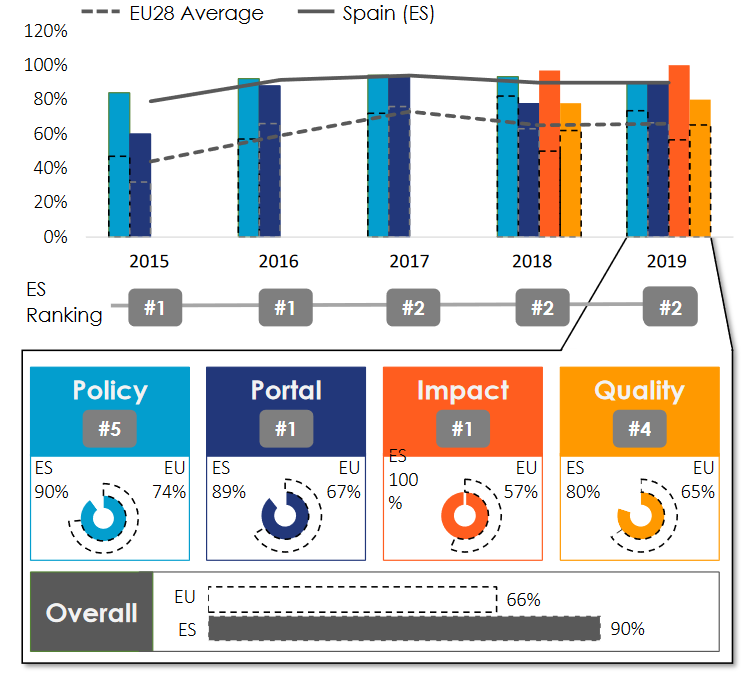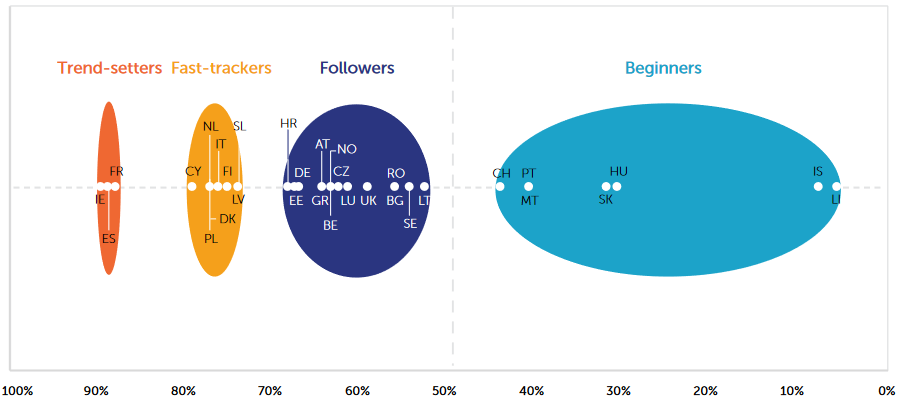
Once again, the European Data Portal has just published its Open Data Maturity Report 2019, which measures the development achieved in the field of open data in Europe. And, as in previous years, Spain occupies the second position, which makes it a prescriber in terms of open data.
According to the report, the average of open data maturity of the EU28 is 66%, only one percentage point above the data obtained in 2018. In the case of Spain, the score obtained has been 90%, three points more than in 2018 and well above the European average. Only Ireland, with 91%, is ahead of Spain.

With this score, Spain is part of the so-called group of Trend setters, along with Ireland and France. The countries that belong to this group are characterized by having an advanced open data strategy and a strong commitment to open data as a strategic asset to drive digital transformation.
In 2018, this group was formed by five countries, but only three have remained in 2019. Spain, like the rest of European leaders, has had to improve its score to continue remaining in the leading group.

At a general level, the report highlights that Europe is entering a consolidation phase, where the focus has been shifted from quantity to quality of published data. Once policies and open data platforms are implemented, European countries are trying to ensure the value of the data by driving its reuse.
Spain is above the European average in the 4 indicators analyzed
To produce the report, the European Data Portal has analyzed 4 key indicators: policy, portal, impact and quality. The growth of Spain has been driven by the portal and impact dimensions, as seen below.

- The “political” dimension analyzes existing policies and strategies to promote open data at the national level, as well as the existence of governance models. Spain's score in this section is 90% -the EU is 74%-, although it has decreased compared to 2018. This is because, although there are specific policies to boost open data, there is still work to be done for its implementation
- The “portal” dimension has been the one that has experienced the greatest growth in the last year, going from 78% in 2018 to 89% in 2019. This dimension focuses on the level of maturity of national open data platforms. For this, it analyzes the functionality, the use (user analysis), the data variety and the approach used to guarantee the sustainability of the platform.
- The “impact” dimension, in which Spain has obtained the best score, assesses the existence of methodologies to monitor and measure the reuse and impact of open data. In this case, the score obtained has been 100%, with a growth of 3 points compared to 2018.
- Finally, the “quality” dimension, which explores the level of automation of European platforms, the accuracy and reliability of the available data and the level of compliance in terms of the DCAT-AP metadata standard, has remained virtually the same as last year: 77% in 2019 compared to 78% in 2018.
Recommendations for further progress on open data
As in previous editions, the report ends with a series of recommendations for all the countries analyzed. In the case of Trend setters, the group to which Spain belongs, the following conclusions are included, among others:
- Promote thematic data ecosystems around the thematic domains defined in the recent Directive on Open Data and the re-use of Public Sector Information.
- Boost data in real time.
- Continue the work on improving the quality of metadata and data by boosting the use of tools (for example, for the validation of metadata).
- Work with training institutions to provide advanced open data courses and training.
- Engage universities and research institutions to develop country-specific metrics to measure impact.
You can see the factsheet of Spain in this link and those of the rest of the countries here.